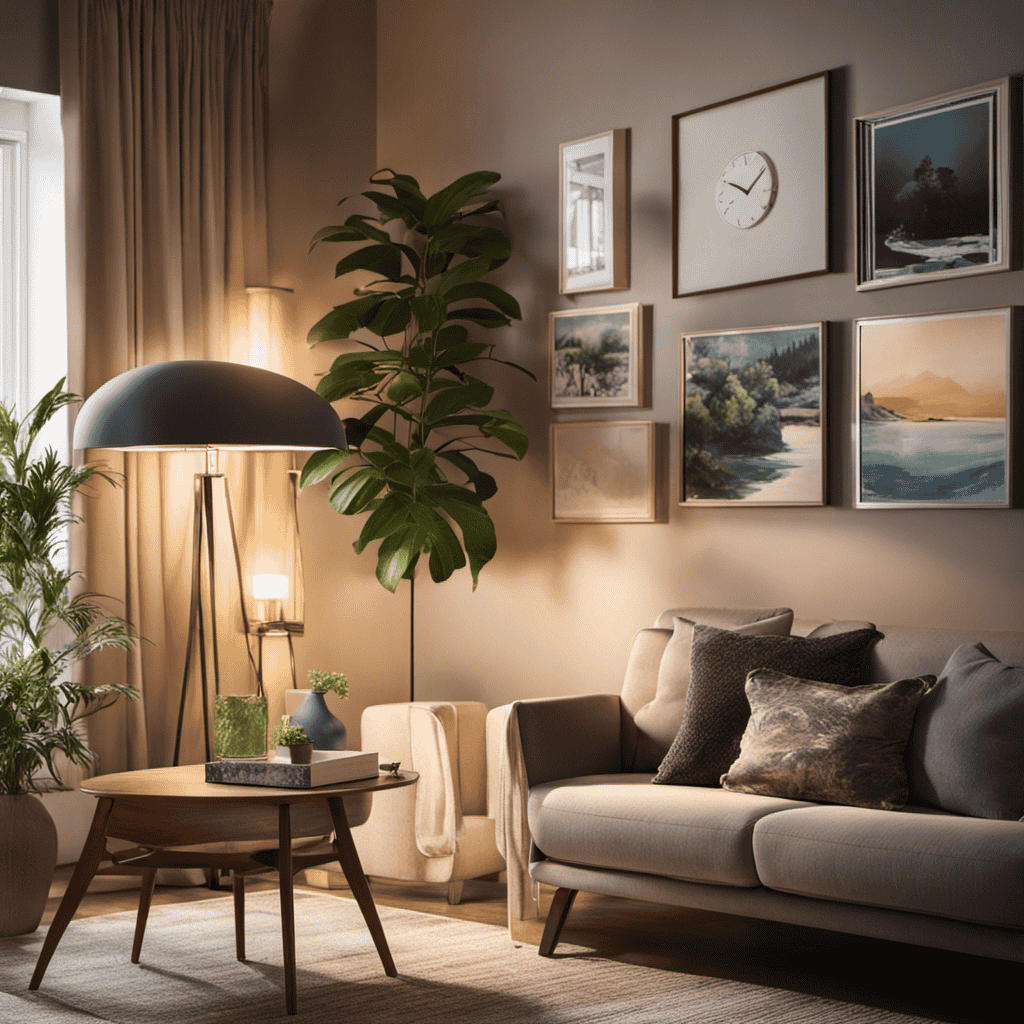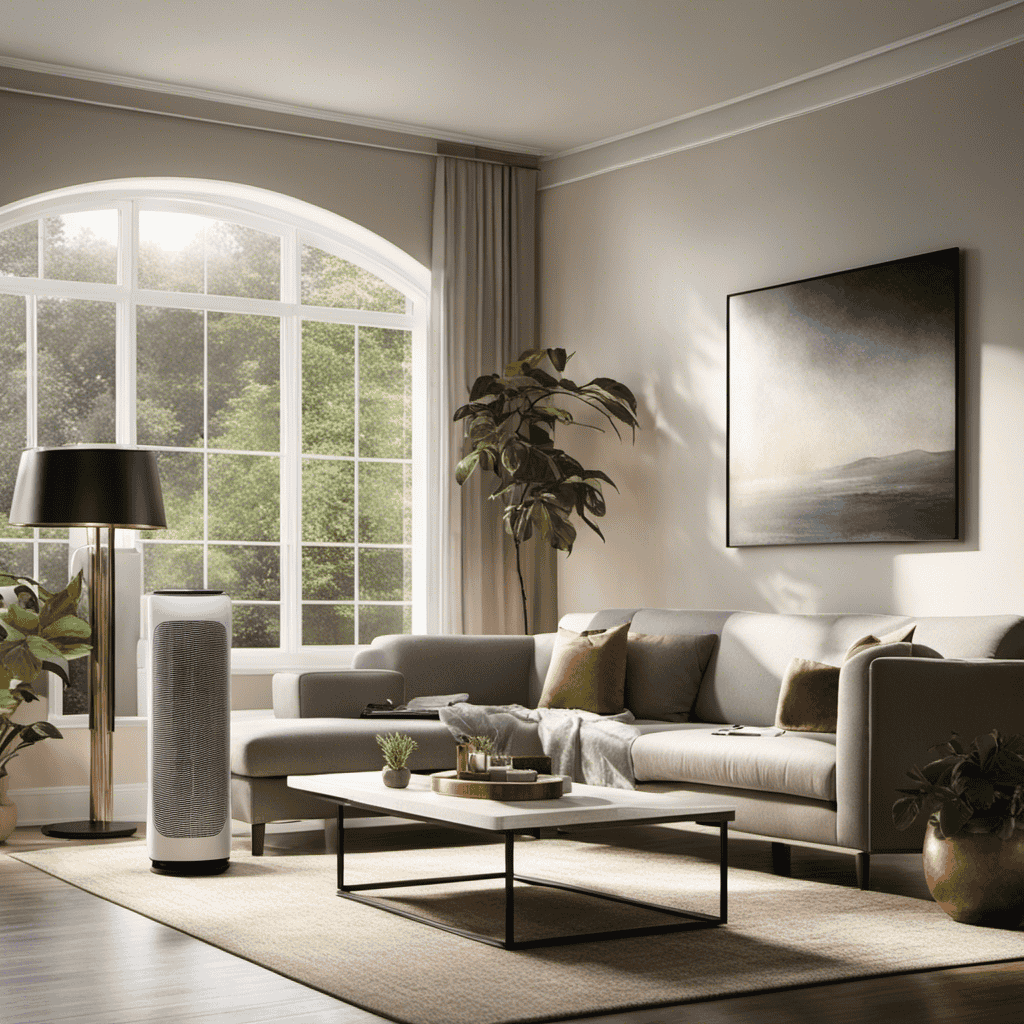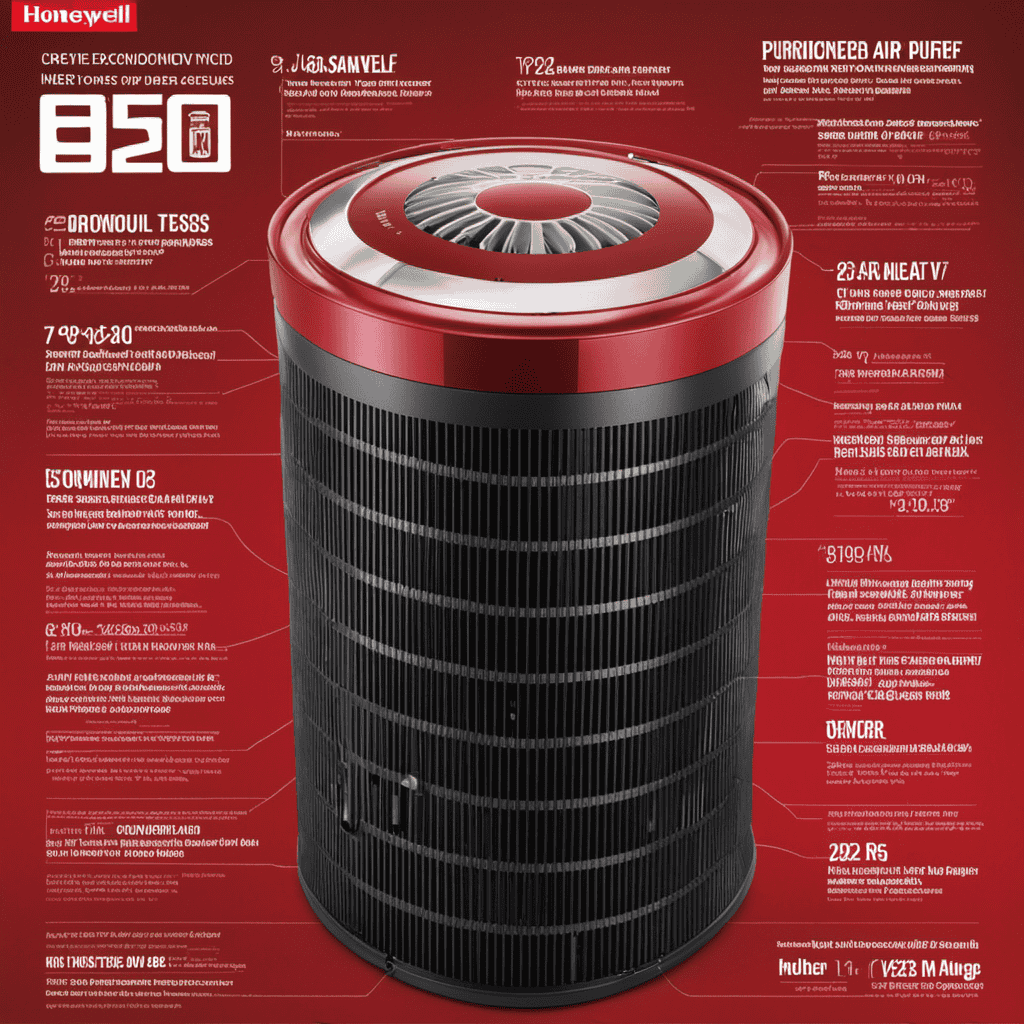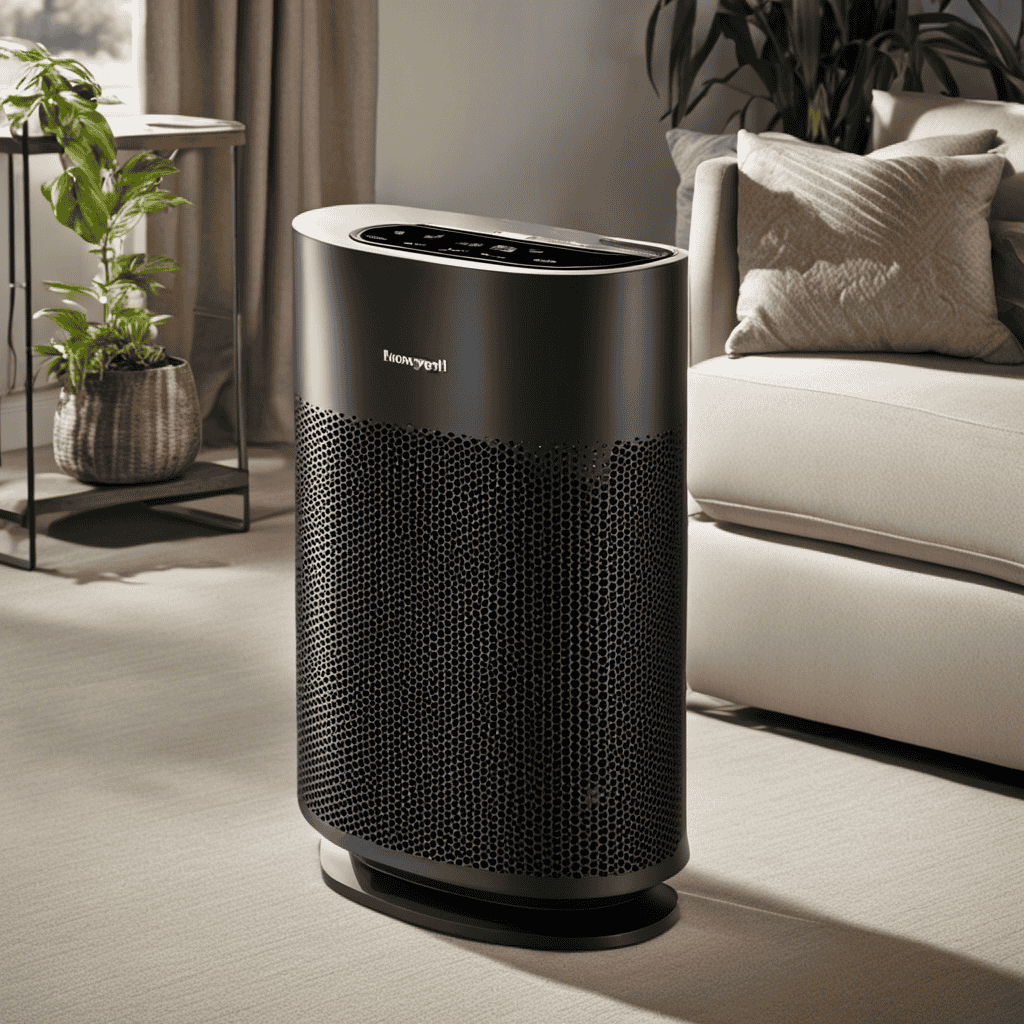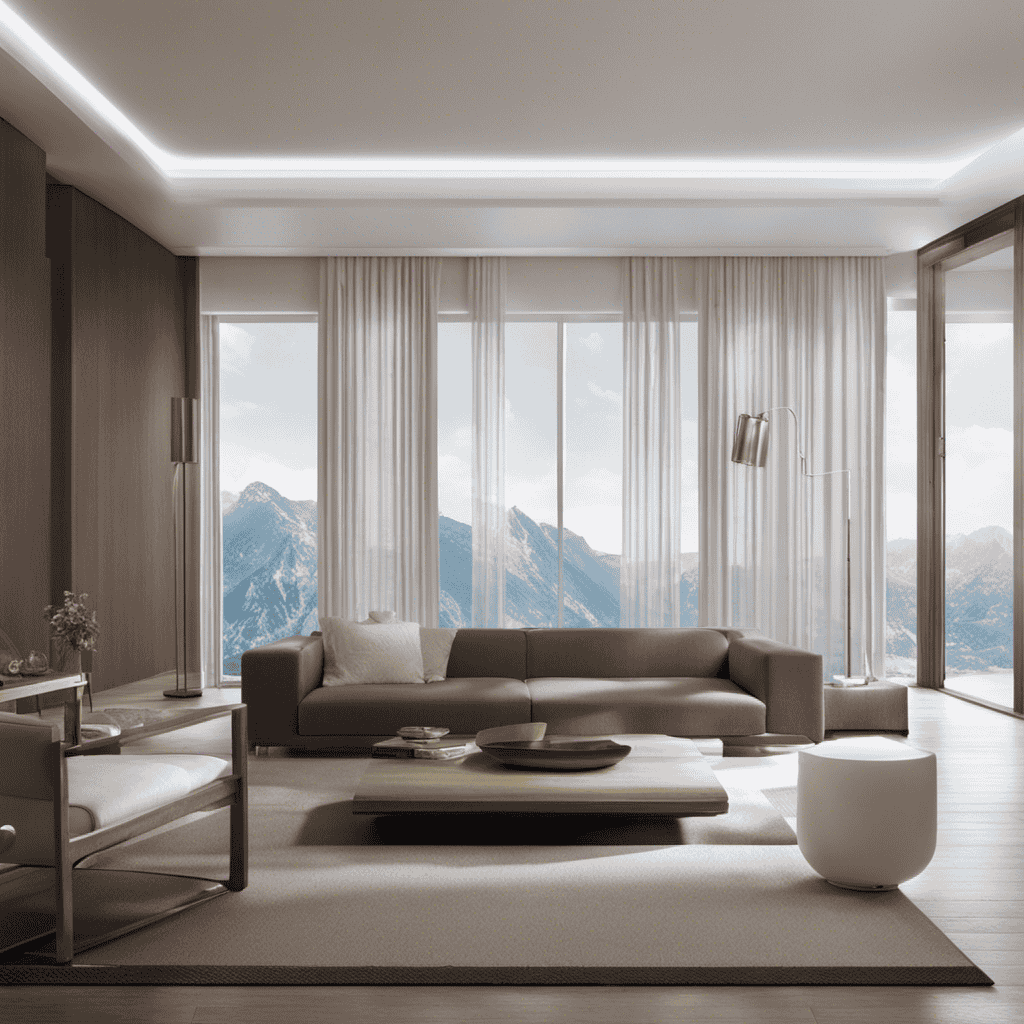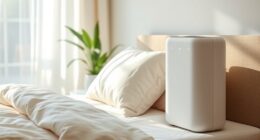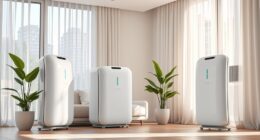I have always been curious about the ideal duration for running my air purifier to maintain the best air quality in my home. Finding a balance between energy efficiency and thorough purification is crucial.
Through my research, I’ve discovered various factors to consider when determining air purifier usage duration. In this article, we’ll explore recommended durations for operating an air purifier, adjusting usage according to air quality levels, and how long to run it in different living spaces.
Let’s dive in and uncover the best practices for maximizing the effectiveness of our air purifiers.
Key Takeaways
- The recommended duration for operating an air purifier is at least 8 hours per day, or continuously.
- The size of the room and air pollution levels in your area can impact the usage duration of the air purifier.
- Regular cleaning or replacing of filters is crucial for maintaining efficiency and optimal performance.
- Adjusting air purifier usage based on air quality levels helps maximize effectiveness and maintain a clean and healthy environment.
Factors to Consider When Determining Air Purifier Usage Duration
When deciding how long to keep your air purifier on, there are several factors you should consider.
The recommended air purifier usage duration varies depending on factors that affect its effectiveness. One important factor is the size of the room where the air purifier is being used. Larger rooms may require longer usage to ensure proper air filtration.
Another factor to consider is the level of air pollution in your area. If you live in an area with high levels of pollutants, you may need to keep the air purifier on for longer periods of time.
Additionally, the type and quality of the air purifier you have will also play a role in determining the recommended usage duration. It is important to follow the manufacturer’s guidelines for optimal results.
Recommended Duration for Operating an Air Purifier
The recommended duration for running an air purifier is typically determined by the size of the room and the level of air pollution. Understanding air purifier maintenance is essential for optimal performance and longevity.
Here are some key benefits of using an air purifier:
- Improved Indoor Air Quality: Air purifiers help remove pollutants such as dust, pollen, pet dander, and smoke particles, improving the overall air quality in your home.
- Allergy Relief: By capturing and trapping allergens, air purifiers can reduce allergy symptoms and provide relief for those suffering from seasonal or year-round allergies.
- Odor Elimination: Air purifiers equipped with activated carbon filters can effectively eliminate unpleasant odors, leaving your space fresh and clean.
To ensure the best results, it is recommended to run the air purifier continuously or for a minimum of 8 hours per day. However, if the room is larger or there is a high level of air pollution, it may be necessary to run the purifier for longer periods. Regularly cleaning or replacing the filters is also crucial for maintaining the efficiency of your air purifier.
Understanding Air Quality Levels and Adjusting Purifier Usage Accordingly
When it comes to optimal purifier usage, it’s important to understand how to effectively monitor air quality.
By regularly checking the air quality levels in your home or office, you can adjust the usage of your air purifier accordingly.
This will ensure that you are getting the most out of your purifier and maintaining a clean and healthy environment.
Optimal Purifier Usage
To maximize its effectiveness, it’s recommended to keep the air purifier on for at least 6-8 hours daily. Continuous air purification has several benefits, including:
-
Improved indoor air quality: Running the purifier for longer periods ensures that the air is constantly being filtered, removing pollutants and allergens. This can be especially beneficial for individuals with respiratory conditions or allergies.
-
Reduction in airborne pathogens: Continuous air purification helps to eliminate harmful viruses, bacteria, and mold spores, reducing the risk of illness.
-
Odor elimination: Keeping the purifier on for longer durations helps to remove unpleasant odors from the air, creating a fresher and more pleasant environment.
Monitoring Air Quality
By regularly checking the air quality, you can ensure that your home has cleaner and healthier air. Monitoring the air quality is an important step in maintaining a balanced and effective air purification system. When considering the effectiveness of air purifiers, it is essential to balance the cost with the desired outcome. Investing in a high-quality air purifier may initially seem costly, but it can prove to be a worthwhile investment in the long run. To help you make an informed decision, here is a table comparing the cost and effectiveness of different types of air purifiers:
| Type | Cost | Effectiveness |
|---|---|---|
| HEPA | Moderate | High |
| Activated Carbon | Low | Moderate |
| Ionizers | Low | Low |
| UVGI | High | High |
How Long Should You Run an Air Purifier in Different Living Spaces
When it comes to running an air purifier, understanding the optimal duration for purification is crucial. Different living spaces have varying air purifier needs, and it is important to consider factors such as room size, air quality levels, and the specific pollutants present.
Research-driven information can guide us in determining the ideal duration for running an air purifier, ensuring that we achieve the best results in maintaining clean and healthy indoor air.
Optimal Air Purification Duration
Running an air purifier for at least 3 hours a day can help maintain optimal air quality in your home. Regular use of an air purifier not only improves the air you breathe but also extends the lifespan of the device itself.
Here are some benefits of continuous air purification:
-
Removes airborne pollutants: Air purifiers can effectively filter out dust, pollen, pet dander, and other allergens, improving indoor air quality and reducing respiratory issues.
-
Eliminates odors: Air purifiers with activated carbon filters can eliminate unpleasant odors caused by pets, cooking, or smoke, leaving your home smelling fresh and clean.
-
Reduces the risk of illness: Air purifiers can trap and remove bacteria, viruses, and mold spores from the air, minimizing the spread of infectious diseases and improving overall health.
Varying Air Purifier Needs
When it comes to air purifiers, there isn’t a one-size-fits-all answer for how long to keep them on. The duration depends on varying factors, such as the size of the room, the level of air pollution, and personal preferences.
To effectively maintain an air purifier, regular maintenance is essential. This includes cleaning or replacing the filters as recommended by the manufacturer and keeping the unit free from dust and debris.
Additionally, adjusting the purifier settings can greatly impact its efficiency and energy consumption. Some purifiers have automatic sensors that detect air quality and adjust the fan speed accordingly, while others allow manual control of the purification settings.
By finding the right balance between air purifier maintenance and adjusting the settings, you can ensure optimal air purification in your environment.
Now, let’s explore how to balance energy efficiency with optimal air purification.
Balancing Energy Efficiency With Optimal Air Purification
To find the right balance between energy efficiency and optimal air purification, you should consider adjusting the settings of your air purifier. By finding the perfect balance, you can ensure that your air purifier is not consuming excessive energy while still effectively purifying the air in your home.
Here are some key points to consider when balancing energy consumption and air purification:
-
Adjust the fan speed: Lowering the fan speed of your air purifier can significantly reduce its energy consumption while still providing adequate air purification.
-
Use the timer function: Set a timer on your air purifier to run it only when needed, such as during peak pollution hours or when you are at home.
-
Choose an energy-efficient model: When purchasing an air purifier, look for models that are Energy Star certified, as they are designed to consume less energy without compromising on performance.
Finding the right air purifier that strikes a balance between energy efficiency and optimal air purification is crucial for maintaining a healthy living environment while minimizing energy consumption.
Signs That Indicate the Need for Extended Air Purifier Use
If your allergies are acting up more frequently, it could be a sign that you need to use the air purifier for longer periods of time.
Factors to consider when determining air purifier usage duration include the size of the room, the level of pollutants present, and the sensitivity of the individuals in the space.
The recommended duration for operating an air purifier is typically 8 to 12 hours a day. However, in cases of severe allergies or high pollution levels, it may be necessary to run the air purifier continuously.
It is important to follow the manufacturer’s instructions and consider the specific needs of your environment.
Understanding the role of filtration technology in determining air purifier usage duration can further enhance the effectiveness of your air purification efforts.
The Role of Filtration Technology in Determining Air Purifier Usage Duration
Understanding how filtration technology works can help you determine how long to use your air purifier.
Filtration technology advancements have greatly improved the efficiency and effectiveness of air purifiers in recent years. These advancements have allowed air purifiers to capture and remove a wide range of airborne pollutants, such as dust, pollen, pet dander, mold spores, and even certain viruses and bacteria.
The impact of air pollution on health cannot be overstated, as it has been linked to respiratory problems, allergies, asthma, and even cardiovascular issues. With the help of advanced filtration technology, air purifiers can effectively remove these harmful pollutants from the air, providing cleaner and healthier indoor environments.
To ensure optimal air quality, it is recommended to run your air purifier continuously or for several hours a day, especially in highly polluted areas or during times when air quality is particularly poor.
Expert Tips for Maximizing the Effectiveness of Your Air Purifier
Running your air purifier consistently and following expert tips can help you maximize its effectiveness.
One important tip is to adjust the settings of your air purifier based on your specific needs. For example, if you suffer from allergies, you may want to set the purifier to a higher fan speed or activate the ‘allergen mode’ if available. This will ensure that the purifier is working at its optimal level to capture and remove allergens from the air.
Additionally, regular maintenance is key to keeping your air purifier in top shape. This includes regularly cleaning or replacing the filters, as well as wiping down the exterior to remove any dust or dirt buildup.
Frequently Asked Questions
Can I Leave My Air Purifier on All Day and Night?
Yes, I leave my air purifier on all day and night. It’s important for air purifier maintenance and provides continuous benefits. Running it at night helps improve indoor air quality while I sleep.
Do Air Purifiers Consume a Lot of Electricity?
Air purifiers do not consume a lot of electricity. They are designed to be energy-efficient. However, it is important to note that not all air purifiers emit harmful chemicals or remove odors effectively.
Is It Necessary to Run an Air Purifier in Every Room of the House?
Running an air purifier in every room of the house is not necessary, but it has its benefits. It helps remove pollutants, allergens, and odors, creating a cleaner and healthier environment.
Can I Adjust the Fan Speed on My Air Purifier to Save Energy?
To save energy, adjust the fan speed on your air purifier. Lower speeds use less electricity but may not filter air as effectively. Consider your needs, such as allergies or odors, when deciding on a fan speed.
How Often Should I Replace the Filters in My Air Purifier?
I replace my air purifier filters every 6 to 12 months to maintain optimal performance. Cleaning the purifier regularly is also important. It’s great for small rooms too, providing clean air for a healthier environment.
Conclusion
In conclusion, determining the duration for operating an air purifier depends on various factors such as air quality levels, living space, energy efficiency, and filtration technology.
By understanding these factors and considering expert tips, you can maximize the effectiveness of your air purifier.
Remember to adjust usage according to air quality levels and keep an eye out for signs that indicate extended use is needed.
With a detail-oriented and research-driven approach, you can ensure optimal air purification for a healthier and cleaner indoor environment.
